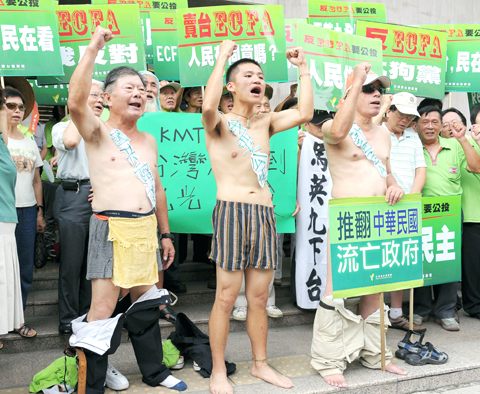The legislature yesterday ratified the cross-strait Economic Cooperation Framework Agreement (ECFA) after a showdown that saw all the Democratic Progressive Party (DPP) caucus’ motions voted down by the Chinese Nationalist Party (KMT) majority.
The vote took place after more than 10 hours of clause-by-clause deliberation, with KMT and DPP lawmakers taking the floor in turn to speak for and against the ECFA.
Yesterday was the first day of the second provisional session of the summer recess initiated by the KMT caucus to have the legislature ratify the ECFA that Taiwan signed with China on June 29.

PHOTO: CNA
Describing the ECFA as the “most important treaty” Taiwan had signed since World War II in terms of its negative impact on the nation’s sovereignty, DPP caucus whip Ker Chien-ming (柯建銘) said his caucus had done its best to warn against the agreement.
“The ECFA was a product of the KMT cooperating with the Chinese Communist Party in bringing Taiwan under the control of China economically, moving toward eventual unification,” Ker said.
The vote proceeded smoothly after the KMT caucus and President Ma Ying-jeou’s (馬英九) administration, initially having insisted on a single vote for the entire ECFA as a package, on Monday agreed to allow motions for revision of the ECFA on an individual basis.
The vote started at 9:20pm. Holding just 33 seats in the 112-seat legislature, the DPP failed in each of its 18 motions.
DPP lawmakers then shouted anti-ECFA slogans, saying the agreement was signed under the “one China” principle.
The KMT caucus, meanwhile, proceeded with its motion to vote for the accord as a whole package.
KMT Legislator Lai Shyh-bao (賴士葆) hailed the passage of the ECFA, saying its implementation would ensure the country’s economic prosperity for 50 or 60 years.
KMT Legislator Lu Shiow-yen (盧秀燕) said “China downgraded itself” to sign the accord in the name of the Association for Relations Across the Taiwan Strait, rather than its official name, in order to help boost Taiwan’s economy.
Upset with the decision, pro-independence advocates gathered outside the legislature cried foul and said the agreement would subject Taiwan to growing Chinese interference.
Holding placards and chanting anti-government slogans, around 50 activists had gathered outside the legislature hours before the vote, saying the review was flawed.
Leading the group, National Taiwan University professor Tsay Ting-kuei (蔡丁貴) said the ECFA would “strip Taiwanese people of everything and was an abuse of the people’s rights.”
To prove his point, he stripped off, along with four other activists.
Other activists climbed onto the legislature’s main gate, shouting the ECFA would leave Taiwan with no future and that it should be put to a referendum. Some painted themselves with green paint, saying that the agreement “raped Taiwan.
Although protestors verbally clashed with police at one point in the evening, no scuffles broke out between the group and police.

NATIONAL SECURITY THREAT: An official said that Guan Guan’s comments had gone beyond the threshold of free speech, as she advocated for the destruction of the ROC China-born media influencer Guan Guan’s (關關) residency permit has been revoked for repeatedly posting pro-China content that threatens national security, the National Immigration Agency said yesterday. Guan Guan has said many controversial things in her videos posted to Douyin (抖音), including “the red flag will soon be painted all over Taiwan” and “Taiwan is an inseparable part of China,” while expressing hope for expedited “reunification.” The agency received multiple reports alleging that Guan Guan had advocated for armed reunification last year. After investigating, the agency last month issued a notice requiring her to appear and account for her actions. Guan Guan appeared as required,

A strong cold air mass is expected to arrive tonight, bringing a change in weather and a drop in temperature, the Central Weather Administration (CWA) said. The coldest time would be early on Thursday morning, with temperatures in some areas dipping as low as 8°C, it said. Daytime highs yesterday were 22°C to 24°C in northern and eastern Taiwan, and about 25°C to 28°C in the central and southern regions, it said. However, nighttime lows would dip to about 15°C to 16°C in central and northern Taiwan as well as the northeast, and 17°C to 19°C elsewhere, it said. Tropical Storm Nokaen, currently

‘NATO-PLUS’: ‘Our strategic partners in the Indo-Pacific are facing increasing aggression by the Chinese Communist Party,’ US Representative Rob Wittman said The US House of Representatives on Monday released its version of the Consolidated Appropriations Act, which includes US$1.15 billion to support security cooperation with Taiwan. The omnibus act, covering US$1.2 trillion of spending, allocates US$1 billion for the Taiwan Security Cooperation Initiative, as well as US$150 million for the replacement of defense articles and reimbursement of defense services provided to Taiwan. The fund allocations were based on the US National Defense Authorization Act for fiscal 2026 that was passed by the US Congress last month and authorized up to US$1 billion to the US Defense Security Cooperation Agency in support of the

PAPERS, PLEASE: The gang exploited the high value of the passports, selling them at inflated prices to Chinese buyers, who would treat them as ‘invisibility cloaks’ The Yilan District Court has handed four members of a syndicate prison terms ranging from one year and two months to two years and two months for their involvement in a scheme to purchase Taiwanese passports and resell them abroad at a massive markup. A Chinese human smuggling syndicate purchased Taiwanese passports through local criminal networks, exploiting the passports’ visa-free travel privileges to turn a profit of more than 20 times the original price, the court said. Such criminal organizations enable people to impersonate Taiwanese when entering and exiting Taiwan and other countries, undermining social order and the credibility of the nation’s